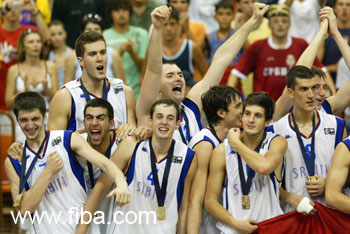 [c]Serbian joy[/c]
[c]Serbian joy[/c]A Well-Deserved Title
Of course, homecourt advantage was important for the local triumph, but we should never undervalue this achievement. Serbia inherited the sturdy spirit that embraced last summers version of the junior squad. It had been one of the very best defenses back in the 2006 U-18 European Championship, but had lacked some offensive punch and versatility despite the reliability of it's inside game, the true foundation of that squad.
From that rocky but eventually and somehow blunt Serbian team that we saw last year, the new version has been able to maintain much of its frontcourt strength and add extremely valuable offensive options.
Moving Stefan Markovic to the point (where he has played all season long for a strong Serbian team such as Hemofarm) provided more creative power. Markovic is not a great scorer, but hes a very nice athlete and a solid passer, very effective splitting defenses and finding the open man. His scoreless performance against USA in the final was an excellent example of his virtues, as he was the main catalyst of his team when the Americans menaced the local team with an aggressive zone defense that demolished the Serbian perimeter fluidity. With no high post player distributing the ball, it was Markovic the one splitting the zone to create scoring opportunities for his team.
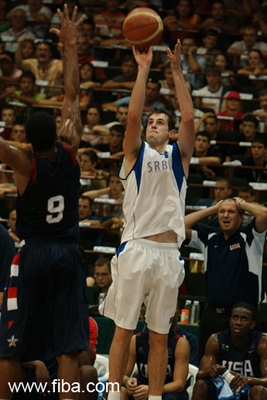 [c]Jeremic bombed the American defense[/c]
[c]Jeremic bombed the American defense[/c]Another area of improvement was the perimeter firepower. Mladen Jeremic emerged as one of the top wings in the championship, greatly improving his role from last summer. For some stretches, he was even the go-to guy for his team. Showcasing a deadly touch, he was aggressive looking for scoring options, also attacking the basket when he had the chance.
Jeremic was well escorted by Stefan Stojacic off the bench. The young sharp-shooter (born in 1989) showed excellent effectiveness either in spot-up fashion or off-the-dribble every time he was left open, and particularly raised his production in the elimination games.
Still the hero was no other than Milan Macvan, the MVP of the championship. With Vladimir Dasic opting to play with Montenegro, Serbia was theoretically left off without its offensive leader. But Macvan stepped up not only to fill those shoes, but also emerged as a more effective leader. Much more focused on his low-post game, he was often unstoppable for his rivals, clueless when trying to stop his combination of strength, technique and knowledge of the game (hes the kind of guy who seems to have been born mature). If left wide open, he took advantage of his solid stroke and also eventually put the ball on the floor to attack his match-ups. Actually, it was really interesting to see him beating much more athletic rivals in the final. Still Milan didnt lead only by example, but he was also a vocal leader for his teammates and a permanent connection with the fans, always being very expressive and particularly sending repeated kisses to the stands.
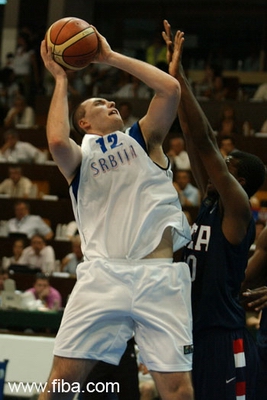 [c]Macvan active in the post[/c]
[c]Macvan active in the post[/c]Miroslav Raduljica and Boban Marjanovic complete the core of the frontcourt game, displaying different roles from last year. If Raduljica played an average tournament, partially due some physical problems, Marjanovic emerged as a useful big center after warming the bench last summer.
On top of that, it was a well-organized and talented squad, playing and executing with intensity and heart on both ends of the court. Congratulations to them.
Mental Battle
For the very first time during the championship, the arena was packed. It was the most desired final, a showdown between the beloved home team, Serbia, and the hated opponent, USA. As it had happened all through the tournament, the national anthems preluded the game.
Right from the moment the chords of the Star-Spangled Banner were audible for the Serbian crowd, a huge swirl of boos roared over every single note. Its a very rude and ugly reaction that still shouldnt surprise anybody aware of what has happened in the Balkans in the last couple of decades.
Anyway, everybody in the US squad stayed concentrated on the national anthem after the first seconds of perplexity; except Michael Beasley, who was throwing visible defiant expressions. He looked to be amassing a great desire to get revenge on the court, but at the same time, it was the expression of someone who believes to be superior even before the game has started. Reality bumped into his intentions.
Right afterwards, 8,000 throats sang in unison Boze Pravde, the Serbian anthem. It was impossible not to feel goosebumps with the atmosphere created in the arena. The setting was ready for the Serbians to make a strong initial run, and that was what exactly happened. Showing better concentration, displaying a very aggressive individual defense with many rotations (Serbia played most of the game with four perimeter players, gaining mobility as a team) and executing on the offensive end, the local squad commanded the score virtually the entire game.
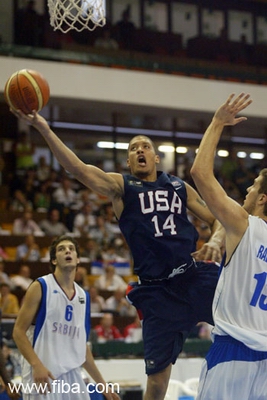 [c]Beasley had a hard time finding a way to the basket[/c]
[c]Beasley had a hard time finding a way to the basket[/c]Beasley ended up as a mediocre performer for USA. 5 points (2/7 FG), 3 rebounds and questionable defense in 14 minutes was a very poor outcome for a player of his caliber.
But the US team as a whole didnt give up regardless of some individualistic actions displayed by Johnny Flynn or Stephen Curry. An excellent zone defense planted by USA created a significant collapse in the Serbian team, particularly in the third quarter and early into the fourth. Perfectly using the athleticism of its players, the zone displayed great activity on the perimeter, limiting the Serbian ball movement but also the low post production (a real headache for the Americans in the first half thanks to Milan Macvan). Besides, the Americans were controlling the rebounding as Miroslav Raduljica was in foul trouble and Macvan struggled a little bit in this department, particularly as a center.
Still Serbia had the edge, helped by the local fans, keeping a great defensive effort, netting some big shots and also helped by the inability of the US squad to get the job done on the offensive end.
Perhaps not the most beautiful final, it was an intense and passionate battle. In the end, even the Americans received a (moderate) ovation from the Serbian fans.
The French Collapse
It was the first final of the championship, an encounter in the semifinal between the two teams with arguably the biggest playing potential in the tournament, France and USA. The Frenchmen dominated most of the game, using their length on defense and talent on the offensive end. During some stretches of the game, the US squad lost some of the team spirit they had showcased in earlier games, with some of the backcourt guys trying to fight their own war. Still. they pull themselves together at some point and kept trying until the very end, with an unexpected reward. France seemed to have the game controlled, but during the last quarter they somehow allowed the victory to slip between their fingers.
USA took control of the paint in the last minutes, scoring inside and dominating the rebounding while the French coach had inexplicitly forgotten Alexis Ajinca on the bench. But France also missed a guy ready to take over the game when the team offense stopped working. That man should have been Nicolas Batum, but the super talented wing was nowhere to be found ever since he allowed a rival to easily steal the ball from him from behind in a transition play with a few minutes to go in the game. Adrien Moerman spent a couple of possessions trying to put the ball on the floor to attack the basket; obviously hes not the right man for this situation. In the end, it had to be Antoine Diot, by far the player with the most character in this team, the one taking the decisive shots. Unfortunately for his team, his inconsistency aroused in the worst possible moment, completing the offensive collapse France suffered in the last minutes of the game.
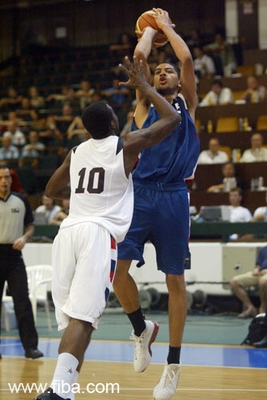 [c]Few shots for Batum at cruch time[/c]
[c]Few shots for Batum at cruch time[/c]Its probably unfair because, globally considered, he didnt play bad at all, but this moment will be remembered as the game where Nicolas Batum certified his lack of character. It makes sense given the importance of the setting and the previous doubts about his ability to take over games. Actually, he will need to work hard to remove that label. And still we shouldnt forget the great work he delivered for most of the minutes he spent on court, emerging as a very important creative force on the offensive end with his off-the-dribble passes, and always working hard on defense.
In the end, Batum might not ever turn into a glamorous NBA star, but chances are he will be an extremely useful guy if he continues with his development.
Promises of Today, Stars of Tomorrow?
It has been 20 years since a Balkan team raised the crown of the World Junior Championship. It was 1987 and the former Yugoslavia was forging the best National Team Europe had ever seen (the team that couldnt play one of the top-two international games history has denied us to witness: USA vs. a united Yugoslavia at the Olympics in 1992). That youth squad featured the likes of Toni Kukoc, Dino Radja, Vlade Divac and Sasha Djordjevic, all soon-to-be European superstars in an era when the Yugo league rivaled the very top European competitions.
Glory days for a basketball that has lost some serious ground in recent years. Since the 2002 World Championship, Serbia has miserably failed to accomplish anything at the senior level, a drought this country (or united as Yugoslavia) had not known for decades. By all accounts, the upcoming Eurobasket will only extend the current lousy track. Growing egos, players skipping the national team call, questionable talent available, all has worked against the Serbian squad.
The hope remains in the new generations. This World Junior crown has just come to feed the success of the U-20 European Championship title, while the U-16 team is one of the main candidates for the gold medal and the U-18 squad stands among a handful of favorites for the upcoming continental championship.
Indeed, if we only take the 87-89 generations, those concerning the title winners, we can come up with interesting players at every position (not necessarily NBA prospects). We have point guards in Milos Teodosic and Stefan Markovic, shooting guards in Mladen Jeremic and Stefan Stojacic, small forwards in Milenko Tepic and Nemanja Aleksandrov (who still didnt make the U-20 squad and can be considered more of an inside guy), power forwards in Dragan Labovic and Milan Macvan and centers in Miroslav Raduljica and Boban Marjanovic. The 1987 generation has been particularly successful, winning at every single category, at the U-20 stage even twice. And every single time, the best player in the team and tournament MVP has been a different guy: Aleksandrov in 2003, Labovic in 2005, Tepic in 2006 (although this time it was the Turkish Ilyasova coming away with the MVP award) and Teodosic in 2007.
Impressive achievements and promising human material that doesnt secure future success.
Its not like the Serbian pool hasnt been producing intriguing youngsters in the last years, and still for some reason it seems too many of them fail to take that final step to establish themselves at the elite of the FIBA world.
Its probably related with the weakness of the Balkan competitions. On one hand, it allows young players to get a very important role in their teams soon while they dont face much pressure (too many highly unbalanced games in the different competitions they play), which might limit their competitive spirit. On the other hand, it forces them to complete their later stages of development in other countries, both because of the playing level and payroll. That always means an adjusting process, not always easy for young guys. The NBA also chimes in, emerging as a premature destination for some of the most promising players.
Well see what happens. It might also be just a bad strike. In the end, an important portion of the European basketball health depends on the own Balkan basketball health. After all, its still the most prolific pool in the Old Continent.
Paulao Prestes, More Than Stats
The championships top scorer, with 23 points per game, and rebounder averaging 14.7 captures (the only player in double digits in this department!) while leading Brazil into the semifinals, Paulao Prestes was definitely a monster in the paint and the centerpiece of his teams success, much more than just a stat filler.
His battle with Andrew Ogilvy in the quarterfinals was a definite highlight in the championship. The best centers face to face. Ogilvy might be taller than the 6-10 Brazilian, but Paulao is a stronger player, more physical, and he took advantage of it.
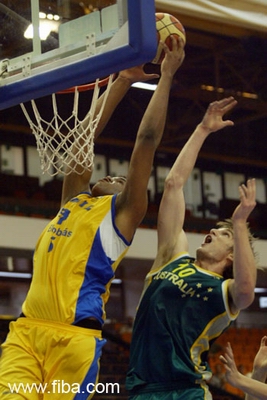 [c]Paulao strong on the paint[/c]
[c]Paulao strong on the paint[/c]
Ogilvy suffered on defense to contest the physical attacks coming from Prestes. The Brazilian player is not a finesse player in the low post; his repertoire of moves is limited, but he uses his strong body pretty well to get the job done, and the Aussie is not the most physical defender around. Paulao also won the battle in the rebounding area, easily gaining the best position thanks to his massive body. On the other hand, Ogilvy abused him by putting the ball on the floor to beat Paulao off the dribble using his superior quickness. Prestes is pretty slow in terms of lateral mobility, which combined with his skill repertoire, leaves his options pretty narrow positional-wise: hes a center all the way, not greatly athletic and a bit undersized at 6-10.
But it was still enough to result in domination in many stretches in this tournament.
His battle with Andrew Ogilvy in the quarterfinals was a definite highlight in the championship. The best centers face to face. Ogilvy might be taller than the 6-10 Brazilian, but Paulao is a stronger player, more physical, and he took advantage of it.
 [c]Paulao strong on the paint[/c]
[c]Paulao strong on the paint[/c]Ogilvy suffered on defense to contest the physical attacks coming from Prestes. The Brazilian player is not a finesse player in the low post; his repertoire of moves is limited, but he uses his strong body pretty well to get the job done, and the Aussie is not the most physical defender around. Paulao also won the battle in the rebounding area, easily gaining the best position thanks to his massive body. On the other hand, Ogilvy abused him by putting the ball on the floor to beat Paulao off the dribble using his superior quickness. Prestes is pretty slow in terms of lateral mobility, which combined with his skill repertoire, leaves his options pretty narrow positional-wise: hes a center all the way, not greatly athletic and a bit undersized at 6-10.
But it was still enough to result in domination in many stretches in this tournament.
Closing Act
It was a nice tournament, perhaps not the one featuring the highest level (only three teams had a realistic shot at the championship), but it definitely delivered games and moments to remember.
Novi Sad nicely hosted the event, showing its variety of beauties and the friendly character of its people. The Vojvodina Center, with its two halls to play games, was an excellent scenario. Unfortunately, the air conditioning was barely even noticed, making the championship one of the basketball events with the highest temperatures Ive ever attended. The heat wave that burns South-Eastern Europe these days didnt help either.
From now on, the U-19 World Championship is projected to be played every two years, and not four, crowding even more the already packed summer calendar of youth basketball events.
Stay tuned for a player-by-player report on the most interesting prospects seen in this championship.














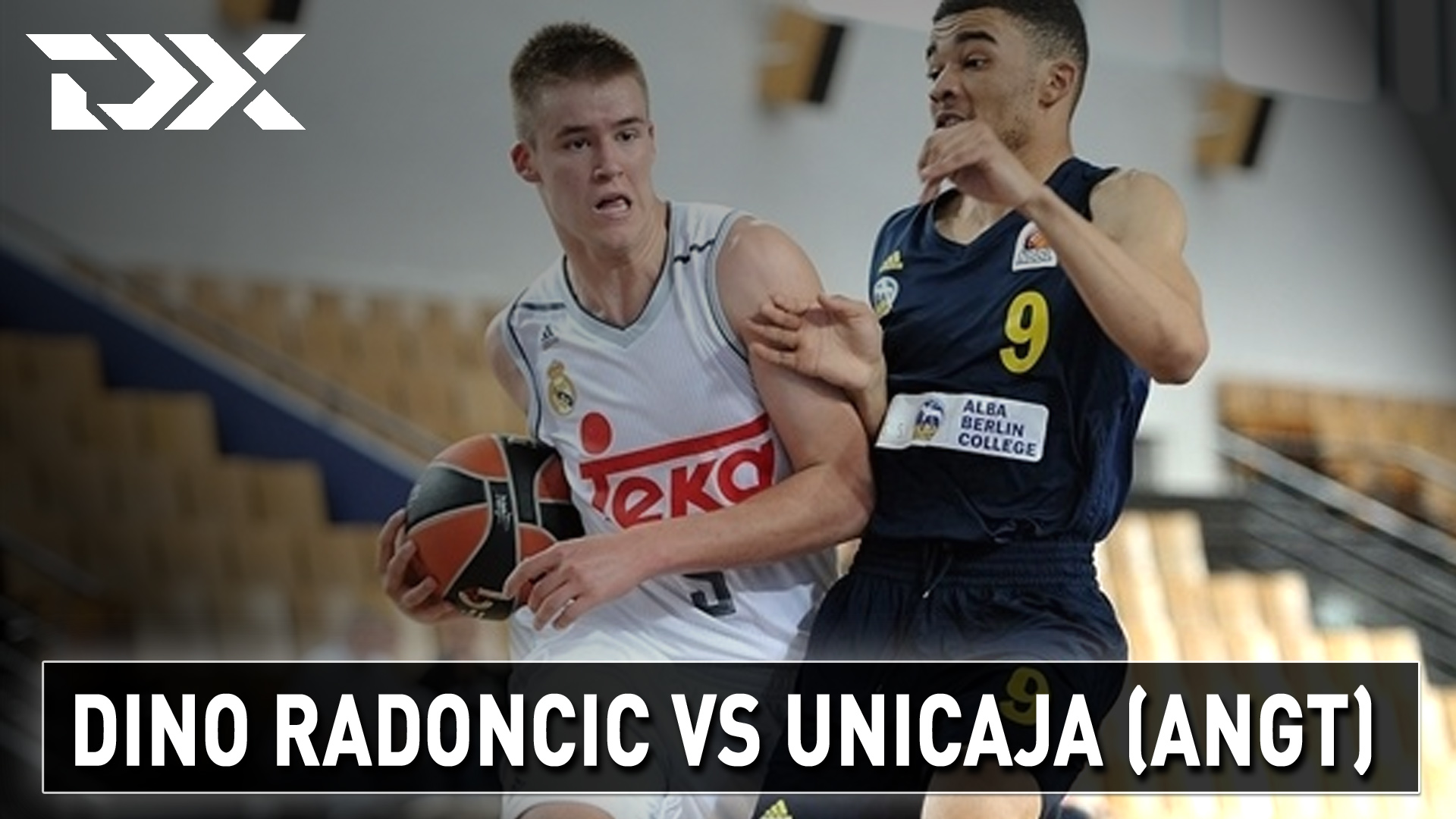
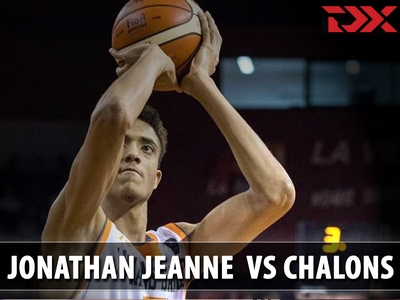



























Comments